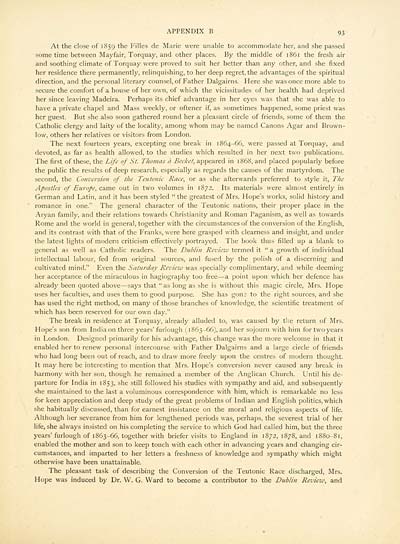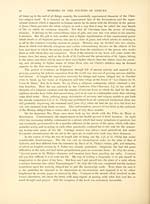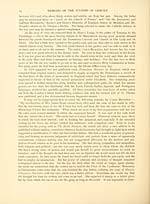Memoirs of the Fultons of Lisburn
(103) Page 93
Download files
Complete book:
Individual page:
Thumbnail gallery: Grid view | List view

APPENDIX B 93
At the close of 1859 the Filles de Marie were unable to accommodate her, and she passed
some time between Mayfair, Torquay, and other places. By the middle of 1861 the fresh air
and soothing climate of Torquay were proved to suit her better than any other, and she fixed
her residence there permanently, relinquishing, to her deep regret, the advantages of the spiritual
direction, and the personal literary counsel, of Father Dalgairns. Here she was once more able to
secure the comfort of a house of her own, of which the vicissitudes of her health had deprived
her since leaving Madeira. Perhaps its chief advantage in her eyes was that she was able to
have a private chapel and Mass weekly, or oftener if, as sometimes happened, some priest was
her guest. But she also soon gathered round her a pleasant circle of friends, some of them the
Catholic clergy and laity of the locality, among whom may be named Canons Agar and Brown-
low, others her relatives or visitors from London.
The next fourteen years, excepting one break in 1864-66, were passed at Torquay, and
devoted, as far as health allowed, to the studies which resulted in her next two publications.
The first of these, the Life of St. Thomas a Becket, appeared in 1868, and placed popularly before
the public the results of deep research, especially as regards the causes of the martyrdom. The
second, the Conversion of the Teuto>iic Race, or as she afterwards preferred to style it, The
Apostles of Europe, came out in two volumes in 1872. Its materials were almost entirely in
German and Latin, and it has been styled " the greatest of Mrs. Hope's works, solid history and
romance in one." The general character of the Teutonic nations, their proper place in the
Aryan family, and their relations towards Christianity and Roman Paganism, as well as towards
Rome and the world in general, together with the circumstances of the conversion of the English,
and its contrast with that of the Franks, were here grasped with clearness and insight, and under
the latest lights of modem criticism effectively portrayed. The book thus filled up a blank to
general as well as Catholic readers. The Dublin Revieiv termed it " a growth of individual
intellectual labour, fed from original sources, and fused by the polish of a discerning and
cultivated mind." Even the Saturday Review was specially complimentary, and while deeming
her acceptance of the miraculous in hagiography too free — a point upon which her defence has
already been quoted above — says that " as long as she is without this magic circle, Mrs. Hope
uses her faculties, and uses them to good purpose. She has gon: to the right sources, and she
has used the right method, on many of those branches of knowledge, the scientific treatment of
which has been reserved for our own day."
The break in residence at Torquay, already alluded to, was caused by the return of Mrs.
Hope's son from India on three years' furlough (j 863-66), and her sojourn with him for two years
in London. Designed primarily for his advantage, this change was the more welcome in that it
enabled her to renew personal intercourse with Father Dalgairns and a large circle of friends
who had long been out of reach, and to draw more freely upon the centres of modern thought.
It may here be interesting to mention that Mrs. Hope's conversion never caused any break in
harmony with her son, though he remained a member of the Anglican Church. Until his de-
parture for India in 1853, she still followed his studies with sympathy and aid, and subsequently
she maintained to the last a voluminous correspondence with him, which is remarkable no less
for keen appreciation and deep study of the great problems of Indian and English politics, which
she habitually discussed, than for earnest insistance on the moral and religious aspects of life.
Although her severance from him for lengthened periods was, perhaps, the severest trial of her
life, she always insisted on his completing the service to which God had called him, but the three
years' furlough of 1863-66, together with briefer visits to England in 1872, 1878, and 1880-81,
enabled the mother and son to keep touch with each other in advancing years and changing cir-
cumstances, and imparted to her letters a freshness of knowledge and sympathy which might
otherwise have been unattainable.
The pleasant task of describing the Conversion of the Teutonic Race discharged, Mrs.
Hope was induced by Dr. W. G. Ward to become a contributor to the Dublin Review, and
At the close of 1859 the Filles de Marie were unable to accommodate her, and she passed
some time between Mayfair, Torquay, and other places. By the middle of 1861 the fresh air
and soothing climate of Torquay were proved to suit her better than any other, and she fixed
her residence there permanently, relinquishing, to her deep regret, the advantages of the spiritual
direction, and the personal literary counsel, of Father Dalgairns. Here she was once more able to
secure the comfort of a house of her own, of which the vicissitudes of her health had deprived
her since leaving Madeira. Perhaps its chief advantage in her eyes was that she was able to
have a private chapel and Mass weekly, or oftener if, as sometimes happened, some priest was
her guest. But she also soon gathered round her a pleasant circle of friends, some of them the
Catholic clergy and laity of the locality, among whom may be named Canons Agar and Brown-
low, others her relatives or visitors from London.
The next fourteen years, excepting one break in 1864-66, were passed at Torquay, and
devoted, as far as health allowed, to the studies which resulted in her next two publications.
The first of these, the Life of St. Thomas a Becket, appeared in 1868, and placed popularly before
the public the results of deep research, especially as regards the causes of the martyrdom. The
second, the Conversion of the Teuto>iic Race, or as she afterwards preferred to style it, The
Apostles of Europe, came out in two volumes in 1872. Its materials were almost entirely in
German and Latin, and it has been styled " the greatest of Mrs. Hope's works, solid history and
romance in one." The general character of the Teutonic nations, their proper place in the
Aryan family, and their relations towards Christianity and Roman Paganism, as well as towards
Rome and the world in general, together with the circumstances of the conversion of the English,
and its contrast with that of the Franks, were here grasped with clearness and insight, and under
the latest lights of modem criticism effectively portrayed. The book thus filled up a blank to
general as well as Catholic readers. The Dublin Revieiv termed it " a growth of individual
intellectual labour, fed from original sources, and fused by the polish of a discerning and
cultivated mind." Even the Saturday Review was specially complimentary, and while deeming
her acceptance of the miraculous in hagiography too free — a point upon which her defence has
already been quoted above — says that " as long as she is without this magic circle, Mrs. Hope
uses her faculties, and uses them to good purpose. She has gon: to the right sources, and she
has used the right method, on many of those branches of knowledge, the scientific treatment of
which has been reserved for our own day."
The break in residence at Torquay, already alluded to, was caused by the return of Mrs.
Hope's son from India on three years' furlough (j 863-66), and her sojourn with him for two years
in London. Designed primarily for his advantage, this change was the more welcome in that it
enabled her to renew personal intercourse with Father Dalgairns and a large circle of friends
who had long been out of reach, and to draw more freely upon the centres of modern thought.
It may here be interesting to mention that Mrs. Hope's conversion never caused any break in
harmony with her son, though he remained a member of the Anglican Church. Until his de-
parture for India in 1853, she still followed his studies with sympathy and aid, and subsequently
she maintained to the last a voluminous correspondence with him, which is remarkable no less
for keen appreciation and deep study of the great problems of Indian and English politics, which
she habitually discussed, than for earnest insistance on the moral and religious aspects of life.
Although her severance from him for lengthened periods was, perhaps, the severest trial of her
life, she always insisted on his completing the service to which God had called him, but the three
years' furlough of 1863-66, together with briefer visits to England in 1872, 1878, and 1880-81,
enabled the mother and son to keep touch with each other in advancing years and changing cir-
cumstances, and imparted to her letters a freshness of knowledge and sympathy which might
otherwise have been unattainable.
The pleasant task of describing the Conversion of the Teutonic Race discharged, Mrs.
Hope was induced by Dr. W. G. Ward to become a contributor to the Dublin Review, and
Set display mode to:
![]() Universal Viewer |
Universal Viewer | ![]() Mirador |
Large image | Transcription
Mirador |
Large image | Transcription
Images and transcriptions on this page, including medium image downloads, may be used under the Creative Commons Attribution 4.0 International Licence unless otherwise stated. ![]()
| Histories of Scottish families > Memoirs of the Fultons of Lisburn > (103) Page 93 |
|---|
| Permanent URL | https://digital.nls.uk/95604373 |
|---|
| Description | A selection of almost 400 printed items relating to the history of Scottish families, mostly dating from the 19th and early 20th centuries. Includes memoirs, genealogies and clan histories, with a few produced by emigrant families. The earliest family history goes back to AD 916. |
|---|

